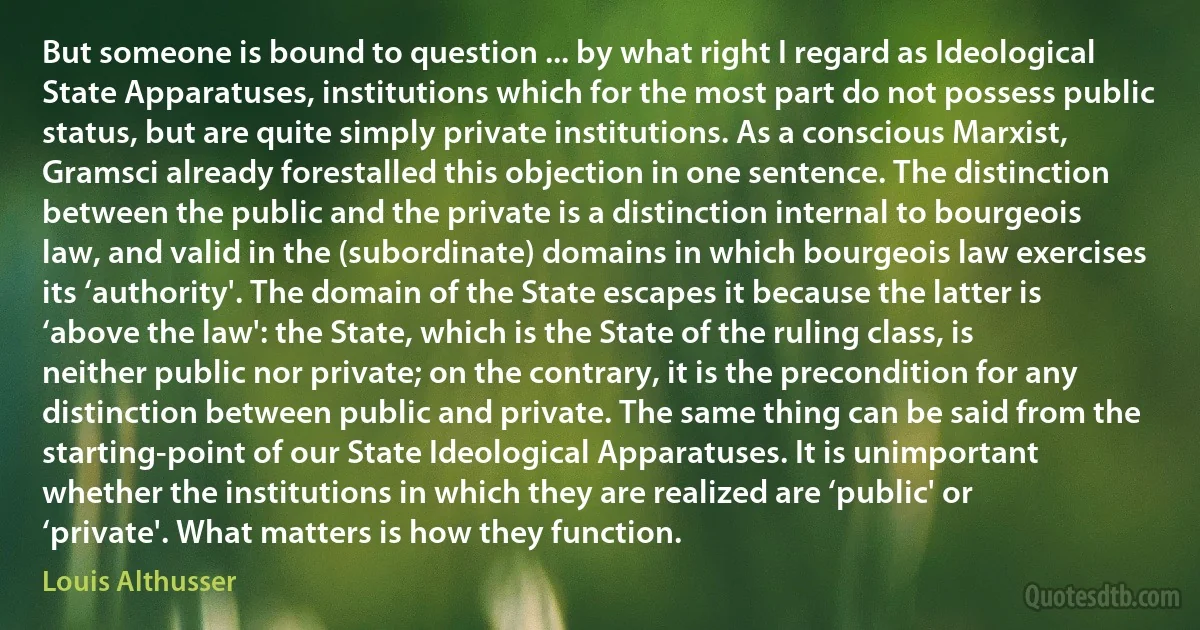
But someone is bound to question ... by what right I regard as Ideological State Apparatuses, institutions which for the most part do not possess public status, but are quite simply private institutions. As a conscious Marxist, Gramsci already forestalled this objection in one sentence. The distinction between the public and the private is a distinction internal to bourgeois law, and valid in the (subordinate) domains in which bourgeois law exercises its ‘authority'. The domain of the State escapes it because the latter is ‘above the law': the State, which is the State of the ruling class, is neither public nor private; on the contrary, it is the precondition for any distinction between public and private. The same thing can be said from the starting-point of our State Ideological Apparatuses. It is unimportant whether the institutions in which they are realized are ‘public' or ‘private'. What matters is how they function.
Louis AlthusserRelated topics
above authority bound bourgeois law nor objection precondition public question quite right say state subordinate thing someone marxistRelated quotes
... a rather different class of applications of the idea of best allocation of scarce resources... usually referred to as the theory of optimal economic growth. In most studies of this kind made in the countries with market economies there is not an identifiable client to whom the findings are submitted as policy recommendations. Nor is there an obvious choice of objective function, such as cost minimization or profit maximization in the studies addressed to individual enterprises. The field has more of a speculative character. The models studied usually contain only a few highly aggregated variables. One considers alternative objective functions that incorporate or emphasize various strands of ethical, political, or social thought. These objectives are then tried out to see what future paths of the economy they imply under equally simplified assumptions of technology or resource availability.

Tjalling Koopmans
[On the attendees at the launch of Apollo 11] Those people were not a stampeding herd, nor a manipulated mob; they did not wreck the Florida communities, they did not devastate the countryside, they did not throw themselves, like whining thugs, at the mercy of their victims - they did not create any victims. They came as responsible individuals able to project the reality of two or three days ahead, and to provide for their own needs. There were people of every age, creed, color, educational level and economic status. They lived and slept in tents, or in their cars, some for several days, in great discomfort and unbearable heat; they did it gamely, cheerfully, gaily; they projected a general feeling of confident goodwill, the bond of a common enthusiasm; they created a public spectacle of responsible privacy - and they departed as they had come, without benefit of press agents.

Ayn Rand
The shattering of modern culture is the result, on the plane of ideological struggle, of the chaotic crisis of these antagonisms. The new desires that are taking shape are presented in distorted form: present-day resources could enable them to be fulfilled, but the anachronistic economic structure is incapable of developing these resources to such ends. Ruling-class ideology has meanwhile lost all coherence because of the depreciation of its successive conceptions of the world (a depreciation which leads the ruling class to historical indecision and uncertainty); because of the coexistence of a range of mutually contradictory reactionary ideologies (such as Christianity and social-democracy); and because of the mixing into contemporary Western culture of a number of only recently appreciated features of several foreign civilizations. The main goal of ruling-class ideology is therefore to maintain this confusion.

Guy Debord
From the fundamental nature of the Philistine, it follows that, in regard to others, as he has no intellectual but only physical needs, he will seek those who are capable of satisfying the latter not the former. And so of all the demands he makes of others the very smallest will be that of any outstanding intellectual abilities. On the contrary, when he comes across these they will excite his antipathy and even hatred. For here he has a hateful feeling of inferiority and also a dull secret envy which he most carefully attempts to conceal even from himself; but in this way it grows sometimes into a feeling of secret rage and rancour. Therefore it will never occur to him to assess his own esteem and respect in accordance with such qualities, but they will remain exclusively reserved for rank and wealth, power and influence, as being in his eyes the only real advantages to excel in which is also his desire.

Arthur Schopenhauer
In the Cabinet there were large Irish proprietors, and, without imputing to any proprietor a desire of doing injustice to his tenants, it was easy to understand that after the long continuance of the present state of the law in Ireland, proprietors were alarmed at any proposition coming to them like the Bill of the hon. Member for Rochdale. The Irish proprietors in the Cabinet, in that House, and out of it, were afraid of a Bill that would interfere with the powers and privileges that a Parliament of landowners for generations past had been conferring upon the proprietors of the soil. That was the point. The question was, could the cats wisely and judiciously legislate for the mice? He did not believe it. He was as much opposed as any man could be to transferring the land from the landlord to the tenant; but a measure of justice was due from the former to the latter, both in Ireland and in this country as well.

John Bright
